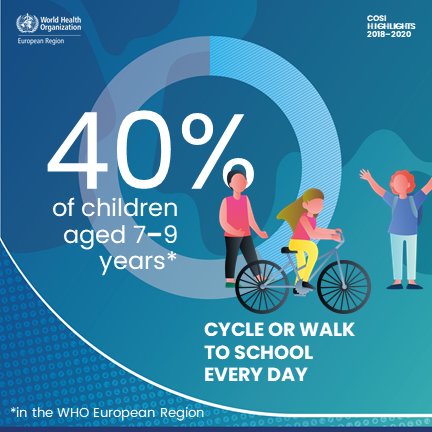Childhood obesity is one of the biggest challenges in the WHO European Region.
According to the latest Childhood Obesity Surveillance Initiative survey results, 31% of boys and 28% of girls aged 7-9 years are living with overweight or obesity.
👇
bit.ly/3t9Vm6A
According to the latest Childhood Obesity Surveillance Initiative survey results, 31% of boys and 28% of girls aged 7-9 years are living with overweight or obesity.
👇
bit.ly/3t9Vm6A

Every day, among children aged 7-9 in the WHO European Region:
🍏Less than 50% eat fresh fruit
🥕Less than 35% consume vegetables
🥤More than 20% consume sweet soft drinks
🍏Less than 50% eat fresh fruit
🥕Less than 35% consume vegetables
🥤More than 20% consume sweet soft drinks

Every day, among children aged 7-9 in the WHO European Region:
🏃♂️🤸almost 90% spend at least one hour playing outside
🚴♂️🚶♀️ 40% of children used active transport (i.e. walking or cycling) to and from school
⛹️♂️🤾♂️🤽 around 50% participate in sport activities
🏃♂️🤸almost 90% spend at least one hour playing outside
🚴♂️🚶♀️ 40% of children used active transport (i.e. walking or cycling) to and from school
⛹️♂️🤾♂️🤽 around 50% participate in sport activities

Differences in childhood obesity in countries show that there are opportunities for policymakers to adopt what works:
↗️ physical activity
↘️screen time
↘️ intake of sweets
↘️ marketing of unhealthy foods
↗️ labelling on food and drinks
🛑 stop the rise in childhood obesity.
↗️ physical activity
↘️screen time
↘️ intake of sweets
↘️ marketing of unhealthy foods
↗️ labelling on food and drinks
🛑 stop the rise in childhood obesity.

Living with overweight & obesity is directly associated with a higher risk of #NCDs such as #CardiovascularDisease, #diabetes & #cancer.
We must use data & policies that can help reduce childhood obesity & overweight, while promoting healthier diets & physical activity.
We must use data & policies that can help reduce childhood obesity & overweight, while promoting healthier diets & physical activity.

The new WHO/Europe COSI report provides a unique overview of physical activity, eating and sleeping habits of children in the WHO European Region.
Find the report here
👇
who.int/europe/publica…
Find the report here
👇
who.int/europe/publica…
• • •
Missing some Tweet in this thread? You can try to
force a refresh










